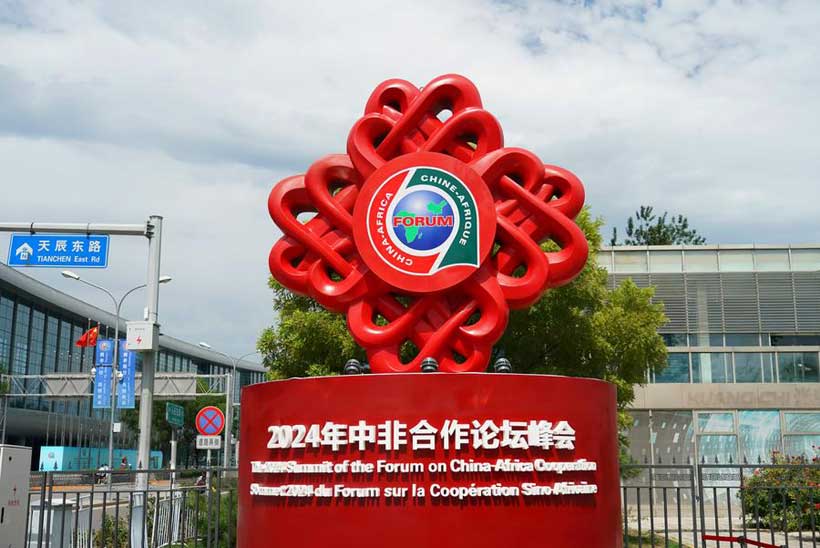Relations between China and Africa are largely influenced by the Forum on China-Africa Cooperation (FOCAC), which was established in 2000. FOCAC is a multilateral platform designed to strengthen economic and political ties between the two sides. FOCAC meets every three years, alternating between China and a host African country, to discuss cooperation plans, investment and aid. Key priorities include infrastructure development, trade, investment, and cooperation on sustainable development and tackling global challenges. Since its inception, China has become a major trading partner for many African countries, with significant investment in sectors such as infrastructure, mining and agriculture. Sino-African relations are often hailed for their ability to offer alternatives to traditional forms of international aid, but they are also criticised for issues relating to debt, governance, transparency, and labour conditions.
FOCAC 2024: themes under discussion
The 2024 Forum on China-Africa Cooperation (FOCAC) focuses on several key themes, such as:
- Sustainable development: Discussions on how to promote sustainable and environmentally friendly economic growth in Africa.
- Infrastructure: Projects to improve transport, energy and communications infrastructure.
- Technology cooperation: Sharing technology and developing digital skills.
- Public health: Initiatives to improve health systems and the response to pandemics.
- Education and Training: Capacity building through education and vocational training.
These topics aim to strengthen the economic and strategic relations between China and African countries, focusing on mutual benefits and long-term development.
What are the potential opportunities FOCAC 2024 could offer?
The 2024 Forum on China-Africa Cooperation (FOCAC) represents a significant opportunity for African countries and China to strengthen their economic, political and cultural relations. Here are some key opportunities:
Investment and Infrastructure: China could increase its investment in infrastructure in Africa, such as roads, ports and railways, providing opportunities for African countries to develop their critical infrastructure.
- Trade: Increased trade is possible, with agreements promoting access for African products to the Chinese market and vice versa, which could stimulate economic growth and market diversification.
- Technology and innovation: Cooperation in technological and digital fields could be strengthened, offering opportunities for Africa to benefit from Chinese technology and improve its own technological capabilities.
- Sustainable development and energy: China could support projects related to sustainable development, renewable energy and natural resource management, helping Africa achieve its environmental sustainability goals.
- Education and training: increased educational exchange and training programmes could offer African students and professionals opportunities to train in China, helping to strengthen local skills.
- Health cooperation: with global health challenges, partnerships in research, disease prevention and treatment could be strengthened.
FOCAC 2024 therefore offers a framework for closer and more beneficial cooperation between China and African countries, with potentially positive implications for economic and social development in Africa.
Challenges FOCAC 2024 could tackle
The 2024 Forum on China-Africa Cooperation (FOCAC), while offering many opportunities, also presents a number of potential challenges:
- Debt: Chinese loans to African countries have raised concerns about debt. Increased dependence on Chinese funding could lead to debt problems and a loss of economic sovereignty for some countries.
- Quality of infrastructure projects: The quality and sustainability of Chinese-funded infrastructure projects can vary. It is crucial that projects are well designed and managed to avoid future problems, such as sub-optimal or unsustainable infrastructure.
- Environmental impact: Some Chinese projects in Africa may have negative environmental impacts if ecological standards are not met, which could harm local biodiversity and ecosystems.
- Sustainable and inclusive development: There is a risk that the benefits of cooperation will not be distributed fairly, and that projects will not always promote sustainable and inclusive development for all sections of the population.
- Sovereignty and influence: China’s growing influence could lead to concerns about the political sovereignty of African countries and the political conditions dictated by cooperation agreements.
- Transparency and governance: There are major concerns about the transparency of agreements and the governance of projects China finances. Corrupt practices or mismanagement could undermine the potential benefits of cooperation.
- Competition: China’s increased presence in Africa could exacerbate tensions with other international partners, who may perceive this growing influence as a threat to their own interests and investments.
These challenges require careful attention and strategic management to maximise the benefits of cooperation while minimising potential risks.
What are the future perspectives to draw from FOCAC 2024?
The future and prospects of China-Africa cooperation within the framework of the Forum on China-Africa Cooperation (FOCAC) depend on several key factors:
- Strengthening economic partnerships: China is likely to continue to strengthen its investments in Africa, focusing on sectors such as infrastructure, energy and technology. The prospects for expanding trade and mutual investment should provide opportunities for economic growth on both sides.
- Support for industrialisation: China could play a crucial role in supporting industrialisation in Africa, providing technology and finance to develop key sectors such as agribusiness, manufacturing and digital services, which could boost job creation and economic diversification in Africa.
- Sustainable development and environment: Future collaborations could include a stronger focus on sustainable development and green projects. China could invest more in renewable energy projects, natural resource management and initiatives to combat climate change.
- Education and innovation: Educational exchange and cooperation in research and innovation should be strengthened, with greater integration of African universities and research centres into global innovation networks, facilitated by partnerships with Chinese institutions.
- Reforms and governance: There is potential for reforms in the way projects are managed, with increased transparency and good governance to address debt and resource management concerns.
- Diplomacy and global influence: China-Africa cooperation could play a key role in redefining global geopolitical alliances, increasing Africa’s influence on the international stage and altering global power dynamics.
- Responding to global challenges: Both sides could work together more closely to respond to global challenges, such as pandemics, economic crises and geopolitical tensions, using their cooperation to build resilience and security.
The future prospects for China-Africa cooperation under FOCAC look promising but require careful risk management to maximise benefits and ensure balanced and sustainable development.
